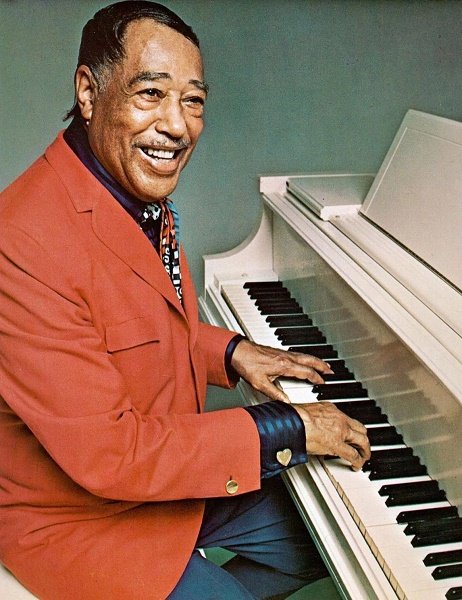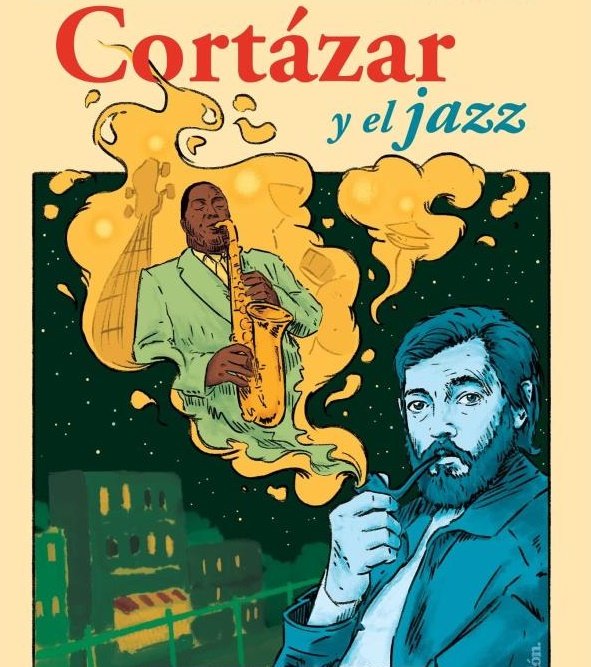Músico capital en el empuje y desarrollo del jazz, sobre todo en la primera mitad del siglo XX, Duke Ellington, falleció hace 50 años, el 24 de mayo de 1974. De nombre original, Edward Kennedy Ellington –al que apodaron "el Duque", por su elegancia y cuidadoso ejercicio musical– fue un compositor, pianista y director orquestal estadounidense, que destacó por su protagonismo en diferentes medios sociales y musicales. Particularmente, por la conducción de su big band, en la que participaron instrumentistas y cantantes de gran valor, como Ella Fitzgerald. Según su biógrafo, Mark Tucker, prefería usar la denominación "música negra americana", en lugar de jazz.

Fue un artista prolífico –tiene en su haber unas mil composiciones– y muy exitoso, alcanzando una carrera discográfica sumamente amplia. Recibió en vida muchos reconocimientos, incluso póstumos: ganador de varios premios Grammy, Paseo de la Fama de Hollywood en 1960, el Premio Pulitzer en 1999. Es de hacer notar su participación en el cine, un tiempo como cortometrajista y luego como compositor de bandas sonoras para filmes (en alguno de ellos actuó, incluso). Cabe también recordar sus inicios en el famoso bar nocturno "Cotton Club", entre 1927 y 1931, donde no sólo conoció el ambiente gansteril de entonces, sino que se vio impulsado a un continuo ejercicio musical, y aprendió de algunos maestros. Al escribir esto recordaba aquel estupendo filme de Francis Ford Coppola, de 1984, con el nombre del lugar; seguidamente, su tráiler oficial: Cotton Club.

Duke Ellington ha sido elogiado en la literatura (igualmente en otras artes). Al proponerme escribir este post, no podía evitar pensar en la sin par novela Rayuela del gran escritor argentino Julio Cortázar, quien fuera un amante apasionado del jazz y el blues. En el cap. 16, en el que se nos presenta parte de la historia entre los integrantes del llamado "Club de la Serpiente", estos, que se encuentran para deleitarse con lecturas y música, escuchan discos de autores de jazz y blues de décadas pasadas, y entre ellos a Ellington. Reproduzco a continuación ese fragmento.
Ronald besó cariñosamente la etiqueta de un disco, lo hizo girar, le acercó la púa ceremoniosamente. Por un instante la máquina Ellington los arrasó con la fabulosa payada de la trompeta y Baby Cox, la entrada sutil y como si nada de Johnny Hodges, el crescendo (pero ya el ritmo empezaba a endurecerse después de treinta años, un tigre viejo aunque todavía elástico) entre riffs tensos y libres a la vez, pequeño difícil milagro: Swing, ergo soy. Apoyándose en la manta esquimal, mirando las velas verdes a través de la copa de vodka (íbamos a ver los peces al Quai de la Mégisserie) era casi sencillo pensar que quizá eso que llamaban la realidad merecía la frase despectiva del Duke, It don’t mean a thing if it ain’t that swing, pero por qué la mano de Gregorovius había dejado de acariciar el pelo de la Maga, ahí estaba el pobre Ossip más lamido que una foca, tristísimo con el desfloramiento archipretérito, daba lástima sentirlo rígido en esa atmósfera donde la música aflojaba las resistencias y tejía como una respiración común, la paz de un solo enorme corazón latiendo para todos, asumiéndolos a todos.
Y ahora una voz rota, abriéndose paso desde un disco gastado, proponiendo sin saberlo la vieja invitación renacentista, la vieja tristeza anacreóntica, un carpe diem Chicago 1929.
You so beautiful but you gotta die some day
You so beautiful but you gotta die some day
All I want's a little lovin' before you pass awayDe cuando en cuando ocurría que las palabras de los muertos coincidían con lo que estaban pensando los vivos.
Como se entenderá, es difícil comentar un fragmento de una novela, y más si se trata de una tan compleja y lúdica como lo es Rayuela. Sin embargo, no quise obviar esta referencia que nos habla de cómo Ellington estuvo (o está) presente en la conciencia de creadores nuestros. La cita de Ellington es muy elocuente: "I don't mean a thing if it ain't that swing" ("No quiero decir nada si no es ese swing"), que nos habla de la identificación vital y la pertenencia de esos músicos (y seguramente, lectores y escuchas, como nosotros) con ese maravilloso ritmo. Todo en medio de una situación propia de los encuentros amistosos y amorosos en grupo, donde los sentimientos conviven. De allí las citas de la novela a esas canciones que expresan el "feeling" de ayer y quizás siempre: "You so beautiful but you gotta die some day " ("Eres tan hermosa pero tienes que morir algún día"), "All I want's a little lovin' before you pass away" ("Todo lo que quiero es un poco de amor antes de que te vayas").
A continuación les dejo videos de algunas de las piezas musicales mencionadas | The following are videos of some of the musical pieces mentioned above:
Duke Ellington - Hot and bothered
Duke Ellington - It don't mean a thing
Con Ella Fitzgerald (1965)
Referencias | References:
https://es.wikipedia.org/wiki/Duke_Ellington
https://en.wikipedia.org/wiki/Duke_Ellington






![Click here to read in english]
#Ellington,"the Duke" of jazz
Capital musician in the push and development of jazz, especially in the first half of the 20th century, Duke Ellington, died 50 years ago years, on May 24, 1974. Originally named Edward Kennedy Ellington – who was nicknamed "the Duke, for his elegance and careful musical practice" – was an American composer, pianist and orchestral director, who stood out for his prominence in different social and musical media. Particularly, for the leadership of his big band, in which highly valued instrumentalists and singers participated, like Ella Fitzgerald. According to her biographer, Mark Tucker, she preferred to use the term "American black music" instead of jazz.
He was a prolific artist – he has about a thousand compositions to his credit – and very successful, having an extremely extensive recording career. He received many recognitions during his lifetime, including posthumous ones: winner of several Grammy Awards, Hollywood Walk of Fame in 1960, the Pulitzer Prize in 1999. It is worth noting his participation in cinema, a time as a short film director and then as a band composer. sound for films (he even acted in some of them). It is also worth remembering his beginnings in the famous night bar "Cotton Club", between 1927 and 1931, where he not only got to know the gangster environment of that time, but was driven to continuous musical practice, and learned from some teachers. When writing this he remembered that wonderful film by Francis Ford Coppola, from 1984, with the name of the place; Next, the official trailer for it: [ Cotton Club </ i>] (https://www.filmaffinity.com/mx/evideos.php?movie_id=476319).
Duke Ellington has been praised in literature (as well as other arts). When I decided to write this post, I couldn't help but think about the peerless novel Hopscotch by the great writer Argentinian Julio Cortázar, who was a passionate lover of jazz and blues. In chap. 16, in which we are presented with part of the history between the members of the so-called "Snake Club", these, who meet to enjoy readings and music, listen to records by jazz and blues authors from past decades, and among themselves to Ellington. I reproduce that fragment below. Ronald affectionately kissed the label of a record, spun it, and ceremoniously held out the pick. For a moment the Ellington machine swept them away with the fabulous antics of the trumpet and Baby Cox, the subtle and casual entrance of Johnny Hodges, the crescendo (but the rhythm was already beginning to harden after thirty years, an old tiger although still elastic) between tense and free riffs at the same time, a difficult little miracle: Swing, ergo soy. Leaning on the Eskimo blanket, looking at the green candles through the glass of vodka (we were going to see the fish at the Quai de la Mégisserie) it was almost easy to think that perhaps what they called reality deserved the Duke's derogatory phrase, It don't mean a thing if it ain't that swing, but why had Gregorovius's hand stopped caressing the Maga's hair, there was poor Ossip more licked than a seal, very sad with the archipreterite deflowering, it was a pity to feel it rigid in that atmosphere where music loosened resistance and wove, like a common breath, the peace of a single enormous heart beating for everyone, assuming them all. And now a broken voice, making its way from a worn record, unknowingly proposing the old Renaissance invitation, the old Anacreontic sadness, a carpe diem Chicago 1929. You so beautiful but you gotta die some day You so beautiful but you gotta die some day All I want's a little lovin' before you pass away From time to time it happened that the words of the dead coincided with what the living were thinking. As will be understood, it is difficult to comment on a fragment of a novel, especially if it is one as complex and playful as Hopscotch is. However, I did not want to ignore this reference that tells us about how Ellington was (or is) present in the consciousness of our creators. Ellington's quote is very eloquent: "I don't mean a thing if it ain't that swing", which tells us about the vital identification and belonging of those musicians (and surely, readers and listeners, like us) with that wonderful rhythm. All in the midst of a situation typical of friendly and loving group encounters, where feelings coexist. Hence the quotes from the novel to those songs that express the "feeling" of yesterday and perhaps always: "You so beautiful but you gotta die some day" ("You are so beautiful but you have to die someday"), "All I want's a little lovin' before you pass away" ("Everything